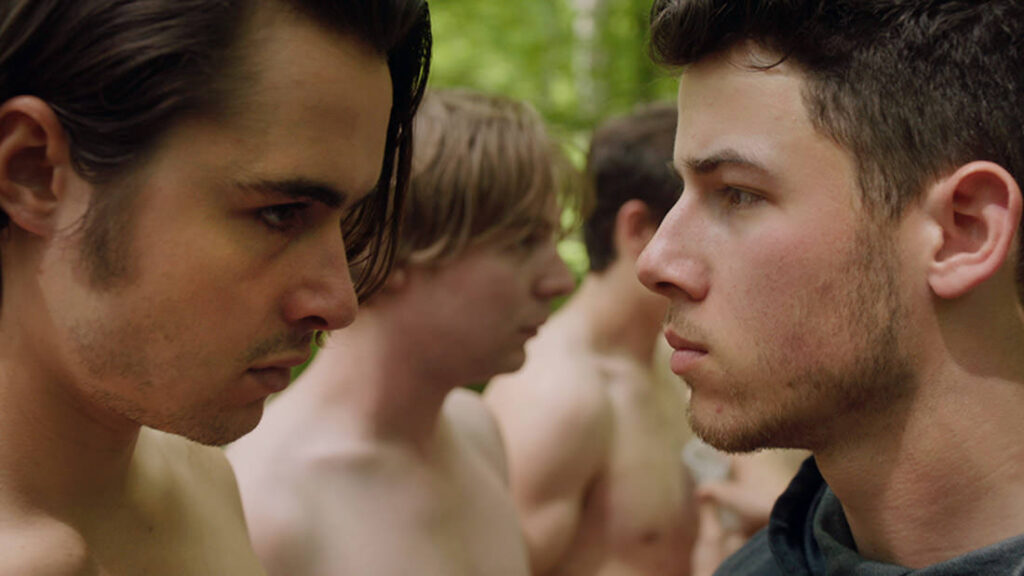Premiering in the U.S. Dramatic Competition at this year’s
Sundance International Film Festival, “Goat” tackles the issue of modern
masculinity as filtered through the exaggerated, sometimes dangerous world of
fraternity culture. More than a mere message movie about the perils of
Hell Week, “Goat” is mostly a character study of two brothers intertwined with a commentary about expectations
placed on young men in a society that rewards the toughest, sexiest, most
extreme alpha males. It is a film with cumulative power by virtue of its
well-drawn, well-performed characters more than its overall sociological
impact. When the film feels like it’s reaching outside of its world to comment
on masculinity as a whole, it falters a bit. When it stays focused on the
harrowing story it tells, it connects.
Brad Land’s (Ben Schnetzer) older brother Brett (Nick Jonas)
is a member of one of the most infamous fraternities at Brookman University. In
the film’s gut-wrenching opening scenes, Brad leaves a party early after it
gets a little too intense for him. On the way to his car, a hooded stranger
asks him for a ride. Brad is understandably tentative, but he’s a nice guy and
relents. That’s when the stranger mentions he’s got a buddy who needs a ride
too. Again, Brad senses he should just drive away, but he waits. After a
tension-raising few miles, the strangers tell Brad to drive down a dirt road,
where they force him out of the car and beat him mercilessly. They steal the
car, but it’s the beating and the questions it raises that haunt Brad. Why did you let them in the car? Why didn’t
you fight back? Why did they chose you to pummel?
As Brad is dealing with PTSD, he draws closer to Brad’s frat
buddies and decides to pledge when he gets back to school in the Fall. Why? Is
he trying to find a brotherhood that will protect him? Trying to learn to fight
back himself? Brett supports the idea, in the hope that it will help his
brother, and the bulk of “Goat” consists of the pledge/hazing process and Phi
Sigma Mu. And here’s where Andrew Neel’s documentary background kicks in. We
are treated to an inside view of a process that is often protected by frats
under the excuse of history but that is outdated at best, and, more accurately,
criminal. Brad and his fellow pledges are abused repeatedly in the frat
basement—beer & liquor poured down their throats; forced to strip;
physically pummeled—and it gets worse from there in a Hell Week that even Brett
starts to question. Two alpha males come to the fore of the story—Chance (Gus
Halper), a friend of the Lands who seems to be pushing Brad even harder than
normal as a response to his “weakness” from the carjacking, and Dixon (Jake Picking),
the wide-eyed leader of Sigma Mu who has it out for Brad from their first
meeting.
On one level, “Goat” is about cycles of violence disguised
as normal masculine behavior. These men are often asked to smack or punch each
other—it’s an essential part of an incredible cameo by James Franco as a former
frat brother who returns for a night of partying—and their histories play into
the idea that violence begets violence in young men. Brad is beaten and so he
seeks a group who can both bolster his protective testosterone and serve as a
shield. When Brett asks if Hell Week is getting worse, Dixon notes that he had
a cigarette put out on his ass last year. Violence has a ripple effect,
especially in young men who are told they’re weak if they can’t kick someone’s
ass.
When one starts asking the “big questions” while watching “Goat,”
the film falters a bit. I’m not convinced Neel knows what, if anything, the
film is saying about modern masculinity as a whole other than college-age boys
are violent people with misplaced priorities and more confidence than
intelligence. In particular, the final act struggles to connect the eventual
tragedy of this true story to its opening scenes, giving us a through line that’s
fuzzy at best, and it’s likely the fact that the reality doesn’t present tidy
closure or grand statement that kept this project in limbo for so long (David
Gordon Green was going to make it about a decade ago and is still co-credited
on the script).
What saves “Goat” is that if the “big movie” doesn’t quite
work, the “little movie” undeniably does. Schnetzer is excellent, conveying a
dark chapter in Brad Land’s life without the over-acting that could have marred
the part. I worried that the bespectacled kid who gave a couple of criminals a
ride in the first scene would turn into Travis Bickle by the end but Schnetzer
takes it slow, recognizing that the core of goodness in Brad wasn’t destroyed
as much as misplaced that night. Jonas, the biggest name in the film, is also
very solid, expertly conveying Brett’s apprehension at bringing his younger
brother into a world for which he may not be ready. Even roles that would have
been caricatures in a lesser film like Chance and Dixon feel like
three-dimensional characters. And Brad Land’s journey ends in a place that
really hit me emotionally more than I expected. He is one of thousands of young
men in this country seeking a place where they are both protected and
protectors. And maybe that’s all the “big picture” that “Goat” needs.












